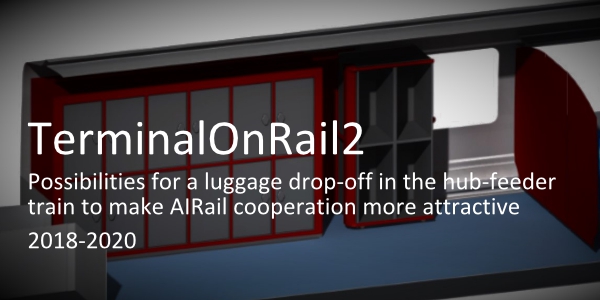TerminalOnRail2

The aim of TerminalOnRail2 is to conduct intensive research into solutions for transferring luggage to the train, which could significantly reduce the minimum connecting time between train and flight and generate a significant increase in attractiveness at various levels.
Client: bmvit, Take Off, Tender 2017
Duration: July 2018 to February 2020 (22 months)
Project partners: University of Applied Sciences Joanneum Graz GesmbH; Technical University Vienna, Institute of Transport Sciences; University of Applied Sciences Upper Austria GesmbH; University of Applied Sciences St.Pölten GesmbH; Austrian Airlines AG; Flughafen Wien AG; Siemens AG Österreich; ÖBB Personenverkehr AG; Promotion&Co.
LOI partners: DLR – German Aerospace Center; Salzburg Airport AG; Westbahn GesmbH; SBB – Swiss Federal Railways; ÖAR- umbrella organisation of Austrian associations for the disabled; newrail – Newcastle University; Frankfurt Airport – FRAPORT.
Project description: Short-haul feeder flights are an important backbone for the airlines’ overall network, but they are often not efficient. This is why there is increasing cooperation between airlines and railway operators in order to shift the hub-feeder lines to the railways by means of code sharing. However, at present these models are not fully exploiting the potential from the customer’s point of view. For example, for 80% of passengers luggage transport is an important reason to decide not to take the train. A lack of luggage-transport services means that the majority of passengers travel to the airport by auto or use feeder flights instead of suitable rail-feeder services.
For about 75% of air travellers, an incentive would be to use AIRail cooperation if luggage could be handed in on the train during their journey to the hub. It is also very important for airlines to reduce the minimum connecting time between feeder trains and flights to the same level as between two flights. In the previous exploratory project TerminalOnRail, it was shown that it is possible to drop off luggage on the train during the journey to the hub, that this measure is desired by passengers and provides an incentive to choose AIRail cooperations and that the minimum connecting time can thus be reduced to the desired level. However, it also became clear that the implementation of a luggage drop-off in the train seems possible but implies very great challenges, especially from a technical and airline-specific point of view.
The aim of the TerminalOnRail2 project is now, through intensive research to search for technical solutions that enable luggage to be delivered on board trains while meeting all the strict requirements of both aviation and rail traffic. The result of TerminalOnRail2 is a feasibility study of a feasible overall system for luggage reclaim in the train during the journey to the hub and a clear definition of requirements for future development steps. All user, technical and logistical requirements and implementation options are clearly defined from the point of view of vehicle technology, the various interfaces at the airport and the security regulations.
Contact: DI Dr. Bernhard Rüger
